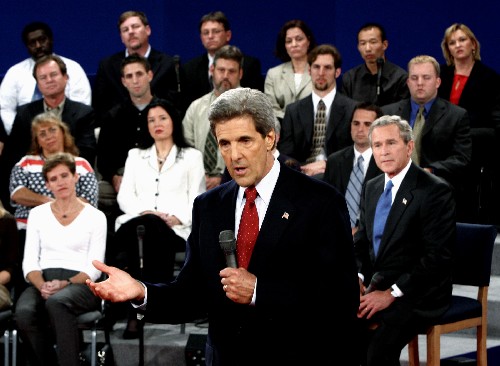
US George W. Bush defended his economic record and his decision to invade
Iraq in the second presidential debate on Friday night, while Senator John Kerry
asserted that Bush was conducting a negative, misleading campaign because he
lacked the record to justify re-election.
The two rivals immediately began a series of attacks and counterattacks in
the opening of the 90-minutes town-hall style debate, held at Washington
University, in St. Louis, Missouri, during which the two faced questions from an
audience of about 140 uncommitted voters.
The opening question asked Kerry to respond to the perception he was
"wishy-washy," and Kerry attacked the president for advertisements suggesting he
had vacillated on Iraq.
"Let me tell you straight up: I never changed my mind about Iraq," Kerry
said. "I would have used that authority wisely -- not rushed into war without a
plan to win the peace."
Bush told the audience that Kerry had consistently shifted positions on Iraq
and was unsuited to lead the nation in a dangerous era. "I don't see how you can
lead this country in a time of war, in a time of uncertainty," Bush said.
Defending his handling of Iraq, Bush said he saw a "unique threat" in former
Iraqi leader Saddam Hussein, "as did my opponent."
In his rebuttal, Kerry said Bush was attacking him to deflect attention from
his own record. "The president didn't find weapons of mass destruction in Iraq,
so he's turned his campaign into a weapon of mass deception," Kerry said.
"The world is more dangerous today, because the president didn't make the
right judgments," he said.
The two candidates quarreled over a variety of other issues such jobs,
education, health care, the environment, and cheaper drugs.
Kerry noted that Bush was the first president since the Depression to preside
over a net loss of jobs.
Asked why he had blocked the importation of cheaper drugs from Canada, Bush
replied, "I haven't yet. I just want to make sure they're safe."
Kerry said that Bush, at a campaign debate four years ago, said he would
allow imports from Canada. "The president just didn't level with you," Kerry
said.
Attacking Bush's tax cuts, Kerry said his economic policy would not focus on
helping the wealthy, as the president's had.
Kerry was asked to pledge not to raise taxes on people making 200,000 US
dollars or less. "Absolutely yes, right into the camera.Yes -- I am not going to
raise taxes," he said.
Bush accused Kerry of denigrating the US-led coalition in Iraq with his claim
that the United States was shouldering 90 percent of the costs and casualties.
"We've got 30 countries there," Bush said.
On Kerry's running mate, Senator John Edwards, a trial lawyer, Bush said that
was a symbol of the Democrats' opposition to reforming the legal system to lower
health care costs.
"We support tort reform," Kerry said. "We will be able to get a fix that has
eluded everybody else because we know how to do it."
The debate came at the end of a week in which the Bush administration found
itself repeatedly on the defensive over its policy in Iraq and on the economy,
and when there was more pressure on following his lackluster performance during
last debate.
Bush held a modest but significant lead in national polls in September before
the debate on Sept. 30. The margin has been reduced after the debate, and a Time
Magazine poll released Friday found each man with 45 percent of the vote.
Bush and Kerry will face in the third and final debate, which will cover
domestic and economic policy, on Oct. 13 at Arizona State University in Tempe,
Arizona.



